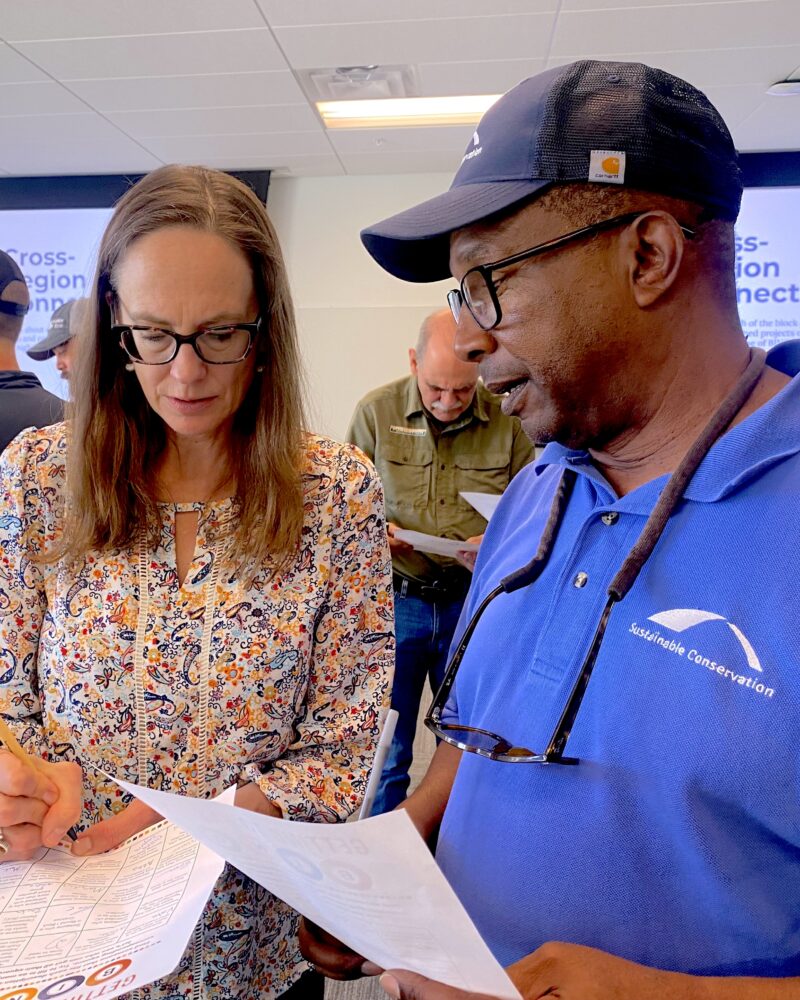East Africa’s iconic landscapes, and the communities that depend on them, are confronting the destructive impacts of the climate crisis. Recognizing the critical threats facing the region’s ecosystems and economies, the East African Community (EAC) and Partner States—Burundi, Kenya, Rwanda, South Sudan, Tanzania, and Uganda—sought external support to develop evidence-based land use and development policies.
In response, USAID Kenya East Africa designed the Economics of Natural Capital in East Africa program (NatCap) to assess the value of natural capital and inform the EAC’s regional policy dialogue. As the prime NatCap implementer, EI, together with our partner Anchor Environmental, sought to improve the conservation and management of transboundary landscapes by directly connecting evidence on the landscapes’ true economic value with stakeholder engagement and action planning.
Over the course of the two-and-a-half-year project, EI learned valuable lessons about facilitating locally led nature-based solutions. Below we share four lessons that shaped our work.
1. Broaden the conversation about what matters
For many policymakers, if the economic impact of a policy can’t be measured, it won’t be considered. Conservation is often seen as a loss in economics – unlike extractive activities such as harvesting timber or minerals, preserving a natural landscape is not considered revenue generating in measures like GDP. Therefore policymakers often lack data to effectively value ecosystem services and stocks of natural assets in routine economic and development planning and decision-making.
To fully capture nature’s contributions to economic prosperity, we must broaden the conversation about what matters. Through a series of facilitated discussions, USAID, the EAC, the private sector, and other regional stakeholders collectively selected four transboundary wildlife landscapes to study. The team assessed the value of nine different ecosystem services and gauged not only what humans currently gain from the natural environment, but also what would be lost if the landscapes were not protected. The final report “Protecting Natural Capital in East Africa: The Cost of Inaction” adds critical evidence and an appeal to advance conservation – noting that failing to protect the four landscapes will cost the region more than $11.3 billion per year over the next few decades.
2. Invest in local capabilities
Building on the EAC’s culture of collaboration was essential to connect research to policy action. Policymakers from all six Partner States, members of multiple private sector industries, community-based natural resource managers, and a range of civil society partners provided guidance from the initial stage of landscape selection through validation of the assessment findings, counseling on gender and social inclusion, development of strategic approaches, and action planning based on the evidence.
Early on we encountered a challenge: many policymakers were not familiar with emerging measures, such as the social cost of carbon, which is increasingly used in natural capital valuation. To create an enabling and inclusive environment, the NatCap team quickly designed a capacity strengthening program focused on the what, the how, the why, and the so what of natural capital valuation to prepare stakeholders to validate the findings. This was essential for stakeholders to be able to adopt the findings to their individual contexts and to support their decision-making roles for policy and management. Making the information more accessible vastly improved the quantity and quality of engagement and feedback from stakeholders.
3. Design for engagement, commitment, and action
To move from data on the shelf to evidence in action, programs must include measures of success that link generation of new knowledge to its application to address development challenges. The EAC was highly motivated to apply the study findings to better understand, design, and advocate for cross-boundary policies. Through the course of the project, EI engaged with over 415 local, regional, and national stakeholders who informed the research, validated the findings, and ultimately designed the Action Plan.
EI developed a comprehensive stakeholder engagement plan to enable collective action and decision-making. The stakeholder engagement plan ensured all relevant actors were involved and developed a locally relevant and effective set of actions, outlined in the the Action Plan, which was designed by and for decision-making stakeholders. In December 2021, leaders from the EAC and Partner States moved to adopt the Synthesis Report and accompanying Action Plan. Then in May 2022, the EAC moved to allocate resources to improve collaboration for conservation programs.
4. Climate action must be collaborative
Over the two and a half years of implementation, our team has shared a common refrain – nature and climate change do not adhere to political boundaries. A cross-border, inclusive, and integrated approach is the better way for dialogue and management of East Africa’s natural capital.
Given the enormity of the threat of climate change to human well-being, one of the most important services nature currently provides is regulating carbon. Understanding the value of natural capital, and the regulating contributions of ecosystems, is essential for tackling climate change in East Africa and globally. The Cost of Inaction report made clear that climate action cannot take place in a vacuum. The report found the landscapes store approximately 7.5 billion tons of carbon and provide the region with $1.12 billion annually in avoided climate change impacts.
We look forward to sharing these lessons with fellow climate stakeholders and leaders at the upcoming UNFCC Africa Climate Week in August 2022 and at the UN Conference of the Parties in November 2022. Ultimately there is no climate solution without nature, and at Environmental Incentives we’re committed to collaborating for action.
Join Us At Africa Climate Week
We’re pleased to share that Dr. Nicholas Oguge, will be sharing the findings from the NatCap project at UNFCC Africa Climate Week in Libreville, Gabon next week. Please join him on August 31 at 2pm for the Action Hub Event “Climate in the Balance Sheet: Defining Ambitions and Accelerating Implementation with Natural Capital Accounting.”



